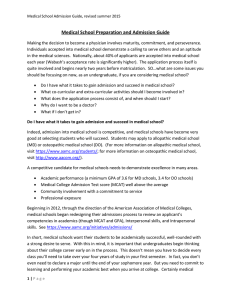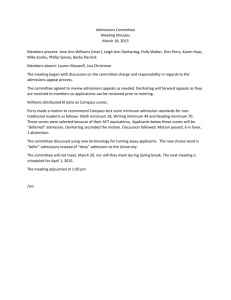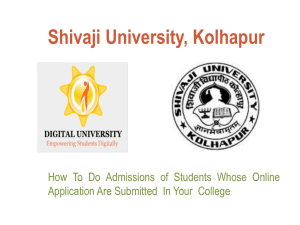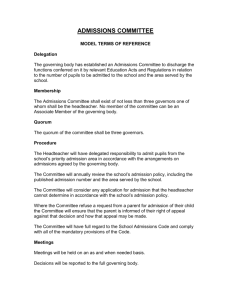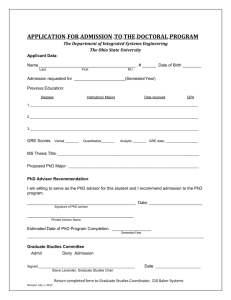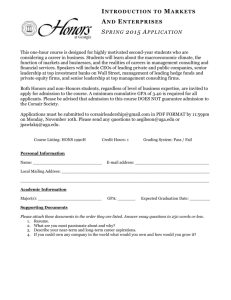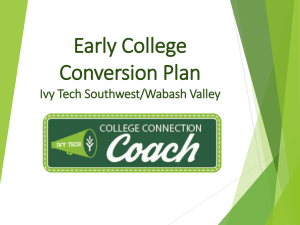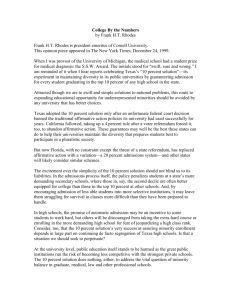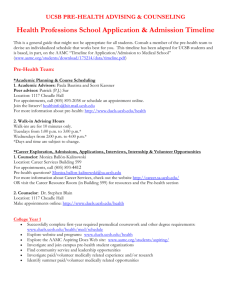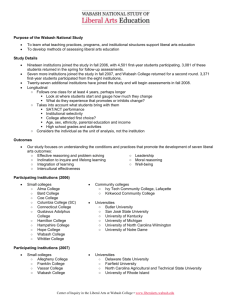Medical School - Wabash College
advertisement
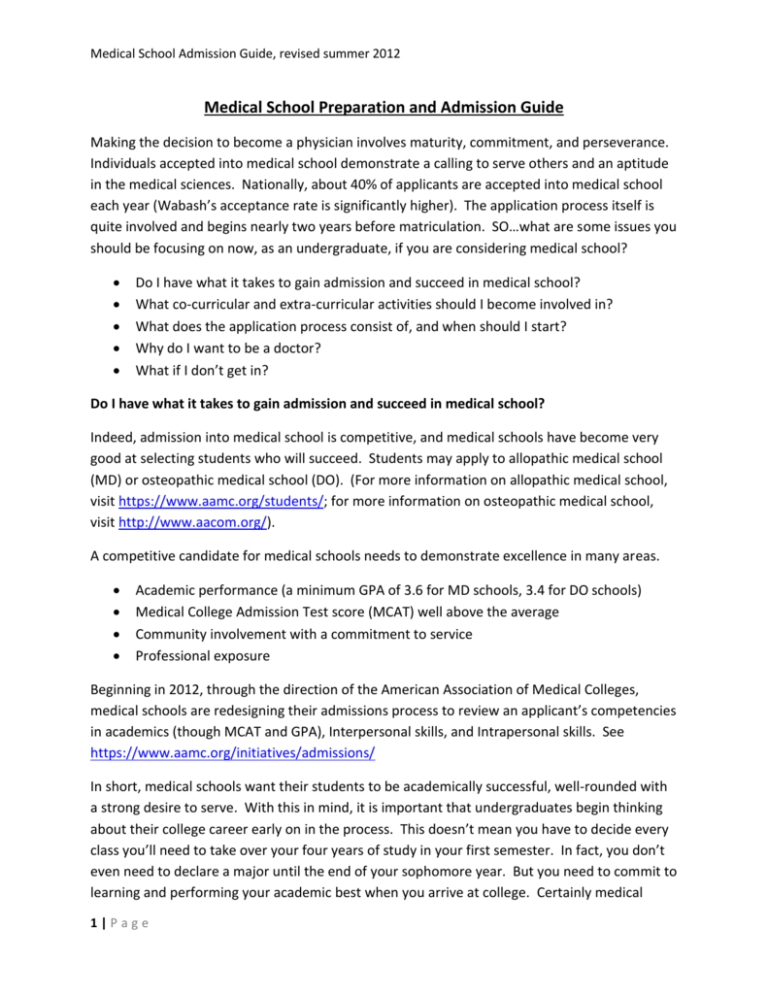
Medical School Admission Guide, revised summer 2012 Medical School Preparation and Admission Guide Making the decision to become a physician involves maturity, commitment, and perseverance. Individuals accepted into medical school demonstrate a calling to serve others and an aptitude in the medical sciences. Nationally, about 40% of applicants are accepted into medical school each year (Wabash’s acceptance rate is significantly higher). The application process itself is quite involved and begins nearly two years before matriculation. SO…what are some issues you should be focusing on now, as an undergraduate, if you are considering medical school? Do I have what it takes to gain admission and succeed in medical school? What co-curricular and extra-curricular activities should I become involved in? What does the application process consist of, and when should I start? Why do I want to be a doctor? What if I don’t get in? Do I have what it takes to gain admission and succeed in medical school? Indeed, admission into medical school is competitive, and medical schools have become very good at selecting students who will succeed. Students may apply to allopathic medical school (MD) or osteopathic medical school (DO). (For more information on allopathic medical school, visit https://www.aamc.org/students/; for more information on osteopathic medical school, visit http://www.aacom.org/). A competitive candidate for medical schools needs to demonstrate excellence in many areas. Academic performance (a minimum GPA of 3.6 for MD schools, 3.4 for DO schools) Medical College Admission Test score (MCAT) well above the average Community involvement with a commitment to service Professional exposure Beginning in 2012, through the direction of the American Association of Medical Colleges, medical schools are redesigning their admissions process to review an applicant’s competencies in academics (though MCAT and GPA), Interpersonal skills, and Intrapersonal skills. See https://www.aamc.org/initiatives/admissions/ In short, medical schools want their students to be academically successful, well-rounded with a strong desire to serve. With this in mind, it is important that undergraduates begin thinking about their college career early on in the process. This doesn’t mean you have to decide every class you’ll need to take over your four years of study in your first semester. In fact, you don’t even need to declare a major until the end of your sophomore year. But you need to commit to learning and performing your academic best when you arrive at college. Certainly medical 1|Page Medical School Admission Guide, revised summer 2012 schools have accepted students who have started out slow in college (and they definitely acknowledge those students who underachieve early on, but later demonstrate academic excellence), but it is challenging to bring your cumulative GPA up above a 3.5 if your first few semesters hover around a 3.0 In the same way, use your undergraduate years, including your summers, to become involved in your school and greater community (see below), along with increasing your knowledge of medicine as a profession (again, see below). Don’t expect to cram activities and internships in at the end of your senior year. Not only will this be obvious to the admissions committees of medical schools, but it might keep you from developing your “humanitarian” side. What co-curricular and extra-curricular activities should I become involved in? When you’re not studying, in lab or class, you should carefully consider how you’re spending your time. We want our future doctors to understand the world around them, right? Medical schools like to see candidates who are involved in their communities. Keep in mind--there is no silver bullet! You need to decide what energizes and motivates you. Each person has their own preferences and circumstances! Some examples include: Wabash community (sports, newspaper, clubs of interest, research, etc.) Crawfordsville community (volunteering, working with local schools, Red cross, health clinics, etc) Home town (service projects and volunteerism) World/global community (service abroad, mission trips, study abroad, immersion learning) Finding meaning and developing a personal stake in your activities demonstrates maturity and commitment. It will probably also make you a more appealing person! If you’re lucky, your volunteerism and service will somehow involve medicine and healthcare, or research. If not, that’s alright, too, but BE SURE that you obtain some professional exposure along the way. At the very least, you must have some shadowing opportunities with physicians or other healthcare providers. Internships or service projects in a medical setting are even better, as they allow you to develop a deeper understanding of what it means to be a doctor and help those in need of medical care. Having exposure to the practice of medicine is an unwritten prerequisite to getting in to most medical schools. If you need assistance finding professionals to work with, your pre-health advisor can get you started. 2|Page Medical School Admission Guide, revised summer 2012 What does the application process consist of and when should I start? The short answer is this: applying to allopathic and osteopathic medical schools begins at the end of your junior year (for those hoping to matriculate the summer after graduation). To learn more about these two professions visit www.aamc.org (MD) and www.aacom.org (DO). In both cases, a centralized application service exists so that you apply only one time, regardless of how many medical schools you choose to apply to (although if you plan to apply to both MD and DO programs, you must apply to each application service). For MD’s the application is called AMCAS; for DO’s it is called AACOMAS. The application has multiple sections where you: List your grades and request transcripts from all colleges you’ve attended List your undergraduate activities, organizations, awards, services, internship, shadowing Compose a personal statement Additionally, the Wabash Pre-Health committee writes a Letter of Recommendation for you. This letter is generated after you solicit a minimum of 5 faculty members who can evaluate your academic performance. Make sure to get to know your faculty! Professors generally appreciate working with students and getting to know you in and out of class. The better they understand your character and strengths, the more meaningful their evaluation letter will be. Once your letter is complete, we will send it directly to the application service(s) you choose to apply to (you will never see the letter). The process of soliciting faculty begins in the spring of your junior year. Finally, you must take the Medical College Admissions Test (MCAT) before your application to medical school is considered complete. Beginning in the spring of 2015, the MCAT will contain 4 sections: Biological and Biochemical Foundations of Living Systems Chemical and Physical Foundations of Living Systems Psychological, Social, and Biological Foundations of Behavior Critical Analysis and Reasoning Skills (read below to understand prerequisite coursework and timing for MCAT2015) Once your AMCAS/ AACOMAS application is complete, your letter of recommendation submitted, and your MCATs taken, you will be asked to submit “secondary” applications to many of the medical schools you’ve applied to. Qualified applicants will be invited for an interview in the fall of your senior year. Almost all medical schools have rolling admissions, 3|Page Medical School Admission Guide, revised summer 2012 meaning you will be informed of your acceptance anytime following your interview up until August after your senior year. Now for the long answer…in order to (1) complete the coursework that will allow you to demonstrate academic preparation for medical school, (2) study for the MCAT exam, and (3) have the extracurricular activities to be competitive for medical school, you really need to start working on your candidacy early on. Over the next few years, medical schools will be reevaluating their prerequisite requirements (and in some cases eliminating them). Instead, medical schools will begin assessing “competencies,” both in academics and character. Stay informed through your pre-health advisor and at aamc.org as medical schools begin to clarify and define a core set of entry-level competencies. At this time, we recommend Wabash students take the following courses to demonstrate academic preparedness: At least one year of Biology (111, 112); Genetics (211)and Cell Biology (212) recommended * One year of general chemistry (111, 211) * One year of organic chemistry (221 and 321) * One semester of Biochemistry (361) * One semester of Psychology (101) * Additional psychology coursework if possible (e.g. Social Psychology 222, Abnormal Psychology 223, Cognition 231, Sensation and Perception 232, Behavioral Neuroscience 233) * One year of physics* One semester of Calculus * These course will help prepare student for the MCAT, and therefore should be taken before a student sits for the MCAT2015 exam. In addition, the MCAT2015 will test information about sociology. While it is not necessary to take a particular course, the AAMC will provide study guides to help students prepare. Your pre-health advisor will give you information when the time comes. As you can see, pre-meds need to take quite a few courses in order to feel confident about the MCAT2015. With this in mind, consider several approaches: 1. If you come to Wabash with very strong math and science preparation and test into at least Calculus 1 (Ma111), you might consider doubling up on your sciences from the beginning (first semester). Speak with your freshman advisor about this, because starting out your first semester with two labs is challenging and not for everyone! 4|Page Medical School Admission Guide, revised summer 2012 2. If you decide to take only one science course your freshman year, you will likely be considering either Chem 111 or Bio 111. Choose first based on your interest. But if you don’t have a strong inclination one way or the other, enrolling in Chem 111 freshman year will allow you to sequence your science coursework in a way that makes the most sense. 3. Consider a gap year in between Wabash and medical school. Most college students do not like to think about adding another year to their journey towards physicianhood. However, for many students, taking an extra year to prepare for medical school makes a lot of sense. Here’s why--In order to matriculate directly into medical school from Wabash, students need to take the MCAT at the end of their junior year. This gives students only three years to prepare for the science and social science content listed above. For some, this is challenging but workable; for others it is unrealistic. For example, students who come to Wabash lacking strong math/science preparation will likely struggle in their science courses if they overload their schedules. Much better to do well in your coursework and develop your skill sets (and earn a respectable GPA) by taking a little longer. Medical schools will respect this decision, and it will give you another year to learn about your future calling. All of this demonstrates maturity and perseverance, two very important qualities for our future doctors. Work with your prehealth advisor and your academic advisor to navigate the path that is right for you, and to look over options for your gap year between Wabash and medical school. Why do I want to be a doctor? This is really the most difficult question of all, and it’s one that you need to be prepared to answer. For one, you will undoubtedly be asked it when you interview. And you will certainly need to speak to your motivation in your personal statement on the application. Even more, who wants to put their health in the hands of somebody who is ambivalent about their professional calling? Becoming a physician is one of the biggest decisions you will make in your life so we want you to be thoughtful and mature in the process. Here are some questions to ponder to help you answer this question: What have I done to serve people over the past few years and how has it affected me? Who have I observed or worked with whom I admire and why? What have been the most gratifying experiences of my college career, and my life? In my academic and co-curricular achievements, what personal qualities have helped me to be successful? Who do I want to be in 10 years? 5|Page Medical School Admission Guide, revised summer 2012 It’s clear after reflecting on these questions why medical schools want you to be well-rounded. The experiences, activities, achievements and professional exposure you should possess when you apply will help grow and define your character and clarify your vocational calling. AND NOW FOR THE QUESTION WE KNOW YOU’RE ALL THINKING ABOUT: What if I don’t get in??? Of course there will be those of you disappointed. And there are many opinions out there, some better than others. But before getting to those, this is probably a good time for some honest self-examination: Do you feel you have the academic ability, curiosity and work-ethic to be a competitive candidate? o If you performed in the mediocre range on your MCATs, struggled to get B’s and C’s in your science classes and feel lucky to graduate with a 3.2, you may want to think about other career options. o On the other hand, if you were a slow starter and didn’t invest your mind or your time fully on medical school admission, but your MCATs were competitive and you’re ready to give it your all, consider reapplying after strengthening your application (see below). What is your “plan B?” Everyone should have one, and now is the time to look at your other career choice(s). If you still feel that medical school is where you want to be, consider re-applying after a year (see below). If not, look at this experience as a time for reflection and move ahead in other directions. Career Services is a great place to start if you need suggestions and guidance. How do you go about re-applying the next year? Generally speaking, medical schools don’t like to see the same application twice, so if you don’t get in the first time around, you’ll need to do something after graduation that enhances your candidacy. Consider meeting with your prehealth advisor as well as a member of a medical school admissions committee. You’ll want to have a frank conversation about the weak points of your application. The most standard route to take is entering a “Post Bacc Program.” These are one or two year curricula designed to enhance your GPA. You will take rigorous science courses, allowing you to demonstrate to medical schools your ability to handle challenging coursework. There are many programs out there, and some options are better for students than others, so check with your pre-health advisor before applying to these programs. If your MCAT is the weak link, you should consider additional preparation and a re-take. 6|Page Medical School Admission Guide, revised summer 2012 Students who lack experience and volunteerism may choose to spend a year doing research, working in a medical setting, or performing service work. If you are committed and have the desire to be a doctor, don’t give up. Medical schools like to see perseverance and dedication. Reapplying certainly demonstrates this! If you have questions about pursuing medical school or other health professions, please contact Jill Rogers, the Wabash Pre-Health Professions advisor, at rogersji@wabash.edu. 7|Page
